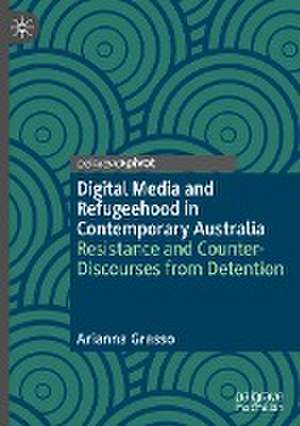Digital Media and Refugeehood in Contemporary Australia: Resistance and Counter-Discourses from Detention
Autor Arianna Grassoen Limba Engleză Hardback – 14 mar 2023
Preț: 353.40 lei
Nou
Puncte Express: 530
Preț estimativ în valută:
67.63€ • 70.07$ • 56.44£
67.63€ • 70.07$ • 56.44£
Carte tipărită la comandă
Livrare economică 21 martie-04 aprilie
Preluare comenzi: 021 569.72.76
Specificații
ISBN-13: 9783031246241
ISBN-10: 3031246241
Pagini: 170
Ilustrații: XVII, 170 p. 30 illus., 10 illus. in color.
Dimensiuni: 148 x 210 mm
Greutate: 0.38 kg
Ediția:1st ed. 2023
Editura: Springer International Publishing
Colecția Palgrave Macmillan
Locul publicării:Cham, Switzerland
ISBN-10: 3031246241
Pagini: 170
Ilustrații: XVII, 170 p. 30 illus., 10 illus. in color.
Dimensiuni: 148 x 210 mm
Greutate: 0.38 kg
Ediția:1st ed. 2023
Editura: Springer International Publishing
Colecția Palgrave Macmillan
Locul publicării:Cham, Switzerland
Cuprins
1. The Australian Mandatory Detention Policy.- 2. Digital Media in Refugee Contexts.- 3. The Tweeting Refugee.- 4. The Imagining Refugee.- 5. The Speaking Refugee.- 6. Conclusions.
Notă biografică
Arianna Grasso is a postdoctoral researcher in the Department of Literary, Linguistics and Comparative Studies at the University of Naples “L’Orientale”, Italy. Her research interests include Australian Populism, Refugee and Digital Media Studies.
Textul de pe ultima copertă
“In her original book, Arianna Grasso explores the function and purpose of digital media for people locked up in Australia's onshore and offshore immigration detention industry. She meticulously analyses the context, content and reception of carefully selected online posts. Her conclusions present this form of writing/activism by people in indefinite detention as both effective political action and a valuable epistemic resource. This study is essential for understanding Australian border violence and the forms of knowledge created by detainees as they work to expose and dismantle the border regime that incarcerates them.”
-Omid Tofighian, University of New South Wales, Australia and Birkbeck, University of London, UK
This book focuses on the resistance practices digitally enacted by a group of refugees in the context of the Australian detention policy. Drawing on critical-, multimodal- and ethnographic-discursive analytical research, the author brings to the fore the digitally mediated lived experiences of detained refugees as articulated from Australia-run offshore and onshore detention facilities. The book unveils how refugees’ self-representation and counter-discursive practices on social media aim to dismantle the dehumanizing, exclusionary, and obliterating anti-refugee rhetoric that pervades political and media landscapes in contemporary Australia. It will be of interest to academics and students in fields including Digital Migration Studies, Refugee Studies, Digital Media Studies, Corpus Linguistics and Critical Discourse Studies, including Multimodal Critical Discourse Studies, and Discourse Ethnography.
Arianna Grasso is a postdoctoral researcher in the Department of Literary, Linguistics and Comparative Studies at the University of Naples “L’Orientale”, Italy. Her research interests include Australian Populism, Refugee and Digital Media Studies.
-Omid Tofighian, University of New South Wales, Australia and Birkbeck, University of London, UK
This book focuses on the resistance practices digitally enacted by a group of refugees in the context of the Australian detention policy. Drawing on critical-, multimodal- and ethnographic-discursive analytical research, the author brings to the fore the digitally mediated lived experiences of detained refugees as articulated from Australia-run offshore and onshore detention facilities. The book unveils how refugees’ self-representation and counter-discursive practices on social media aim to dismantle the dehumanizing, exclusionary, and obliterating anti-refugee rhetoric that pervades political and media landscapes in contemporary Australia. It will be of interest to academics and students in fields including Digital Migration Studies, Refugee Studies, Digital Media Studies, Corpus Linguistics and Critical Discourse Studies, including Multimodal Critical Discourse Studies, and Discourse Ethnography.
Arianna Grasso is a postdoctoral researcher in the Department of Literary, Linguistics and Comparative Studies at the University of Naples “L’Orientale”, Italy. Her research interests include Australian Populism, Refugee and Digital Media Studies.
Caracteristici
Draws on different disciplinary fields, quantitative and qualitative approaches Explores digitally mediated lived experiences of detained refugees Unveils how refugees’ self-representation dismantles anti-refugee rhetoric
